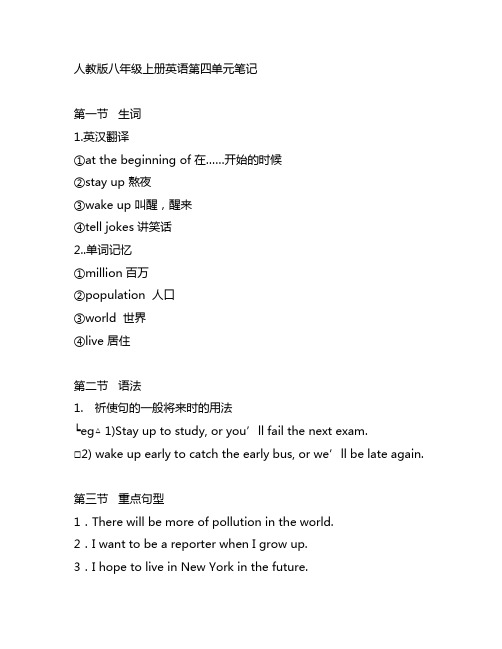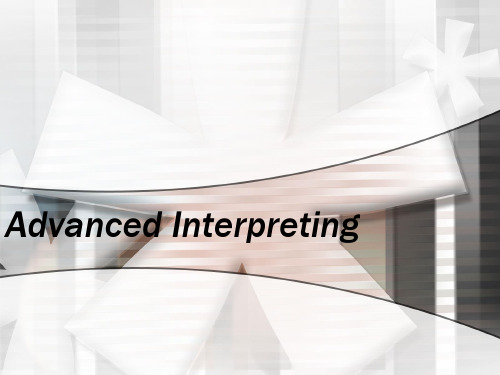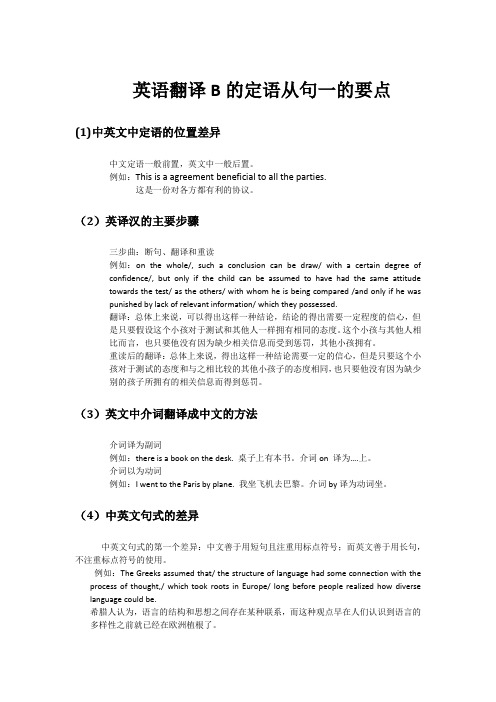英语翻译课堂笔记
人教版八年级上册英语第四单元笔记

人教版八年级上册英语第四单元笔记第一节生词1.英汉翻译①at the beginning of 在……开始的时候②stay up 熬夜③wake up 叫醒,醒来④tell jokes 讲笑话2..单词记忆①million 百万②population 人口③world 世界④live 居住第二节语法1. 祈使句的一般将来时的用法┕eg△ 1)Stay up to study, or you’ll fail the next exam.□2) wake up early to catch the early bus, or we’ll be late again.第三节重点句型1.There will be more of pollution in the world.2.I want to be a reporter when I grow up.3.I hope to live in New York in the future.第四节重点语法1.一般将来时的构成┕eg△ ①S+will/shall+V原②S+be (am,is,are) going to +V原形第五节课文朗读课文内容并不难,语法知识比较简单。
课文中描写了Micheal对自己将来的计划和希望。
他计划要成为一名记者,并且希望生活在纽约。
同时他也表达了对世界环境问题的担忧,并呼吁人们保护地球环境。
第六节教学反思本节课重点是教授祈使句的一般将来时的用法,通过对名人对未来的展望以及对未来环境的担忧,引导学生讨论未来将会出现的问题。
同时在语法知识和课文内容之间,起到温故知新的作用,使学生更好理解和记忆重要的知识点。
总结本单元主要围绕“未来计划”、“担心未来环境问题”这两个主题展开,通过学习表达未来计划的话语和表达环境污染来传授语法知识以及培养学生的未来意识。
通过这个课堂能让学生知道教室里的学习和日常生活有多少要求和呼吁以及期望,使学生明白要求要做到积极主动。
lesson 13 英译汉口译笔记 课堂版

• Split attention • Noting too much, irrelevant things • Confusing notation (illegible) • Missing links • Reading back • Comments on student practice • By Shi Xiaojing
• 第一句 和 最后一句 • 第一句: 没有上下文的依托,但第一句往往又是主题句,只管重
要
• 最后一句:译员听完讲话后几秒钟内就要开始口译,即使很短暂 •
的沉默都可以导致冷场,所以往往顾不上记完笔记马上就回到笔 记的开头开始翻译了 一般的听众往往对最后一句记忆最深刻,也往往用最有一句的翻 译来衡量译员的好坏,更不用说在访谈类的口译中,最后一句往 往是用来提问或者转换话题的,不译出来则可能是访谈无法持续 下去。
• By Shi Xiaojing
• How do students’ and professors’ notes differ? Students tend to write A LOT, which usually
for “now”, maybe unrecognizable later
By Shi Xiaojing , 2009
•课堂笔记一般是有充足的时间用一种
语言记录完整的内容以供课后复习参 考,而口译笔记则是快速地用多种语 言、符号、缩略形式记录部分信息, 以便即时将内容译出。
•速记,是用特别简单的记音符号和词语缩写符号迅速记 •
•首先,请允许我代表企业员工对法
国代表团表示热烈
保持9%左右的速度增长,令世人 瞩目
• 首先,请允许我代表企业员工对法国代表团表示热烈欢迎
欢迎
(七上)英语课堂笔记

Unit 1name n.名字v.取名nice-looking 好看nice work/good job 干得好meeting n.会议meeting room 会议室too n.&adv. 太过于…(贬义) so 太…(褒义)too在否定句中要改为either翻译句子活到老,学到老. It’s never too old to learn.今天的气温在零度以下. It’s below zero today.一辆汽车有四个轮子. There are four wheels in a car.他有九十个学生. He has ninety students.你的电话号码是多少? What’s your phone number?星期天是一周的开端. Sunday is the first day of a week.北京是中国的首都. Beijing is capital of China.她正站在教室的中间. She is standing in the middle of the classroom.她在一所中学学习. She studies in a middle school.above ……以下below ……以上difficult 一般后面的名词为复数.buy sth. for sb. (buy sb sth)为某人买某物give sth. to sb. 给某人某物clothes store 服装店 a set of books 一套书the lunch is ready 午饭做好了tell sb. about sth. 告诉某人有关某事chair 表示坐着的时候如果椅子有扶手靠背用in作介词,如果没有则用on,我把我的毛衣落在操场上了. I leave my sweater on the playground.Go into my home 进入我家里Unit 2A piece of…. 一张;一片 a piece of paper 一张纸News(不可数名词) 新闻;消息 a piece of news 一则新闻Bread(不可数名词)面包 a piece of bread 一片面包desk 课桌;书桌;办公桌at the table 坐在桌旁at table 就餐home 家(抽象概念)house 指家庭居住场所family 1.指家庭整体(可数)There are ten families here.这有十个家庭2.指家庭成员(复数概念)My family are watching TV. 我的家人们正在看电视我家正在吃饭. My family are at table.decide 决定be decide to do sth. 决定做某事mistake 错误make mistake 犯错翻译句子我妈妈是位家庭主妇. My mother is a housewife.下星期我要去看我的奶奶. I’m going to visit my grandmother next week.她的姓氏是史密斯. Her last name is Smith.这些书是她的. These books are hers.一年有365天. There are 365 days in a year.date 强调日期,具体到年月日day 指我们意义上的一天day and night 日日夜夜day after day 日复一日who 谁WHO 世界卫生组织她的家人都很健康. Her family are well. / All her family are well.树底下的那个女孩是谁? Who’s that girl under the tree?她有两个儿子,但没有女儿. She has two sons,but hasn’t any daughters.我有一些我家人的照片. I have some photos of my family.我想给我的家人照相. I want to take pictures for my family.我的椅子在你旁边吗? Is my chair near you?什么是同位语?This is my friend Jane.例句中的my friend和Jane是同一个人.Jane是用来进一步说明my friend的,是my friend 的同位语.由此可见,同位语指一个名词放在另一个名词后面,进一步说明前一个名词代表的是谁或什么事物.我们的老师格林先生来自加拿大. Our teacher Green,is from Canada.我的弟弟迈克不在家. My brother,Mike,isn’t at home.Unit 3Excuse me 用在打断别人说话;有意识地打扰到别人;询问Sorry 侧重于事后道歉be sorry for …为什么事而难过;道歉thank you for = thanks for for后面可搭配名词/动名词/代词感谢你的帮助. Thank you for your help.= Thank you for helping me.Welcome to…欢迎来到…….(如后面为地点副词则去掉”to”)game 大大小小的不同项目的比赛match 竞技类的比赛the Olympic Games 奥运会play cards 打扑克牌ring 原始的铃声请给我打电话. Please ring me up.ask 后面是对象for 后面是所要讨要的东西她总是向她爸爸要钱. She always ask her father for money.ask 意为询问;提问你能询问去公园的路吗? Can you ask the way to the park?find 注重的是结果look for 侧重为寻找过程翻译句子你今天必须看医生. You must see a doctor today.不准你在马路上踢足球. You mustn’t play football on the road.现在我必须走吗? –是的/不需要. Must T go now? –Yes,you must./No,you need’t.他正高兴地看着我. He is looking at me happily(adv.修饰动词)他看起来很高兴. He looks happy. ←[形容词] 修饰系动词hair n.(不可数)当强调一根一根头发时可数.every day 每一天everyday 日常形容词性与名词性物主代词物主代词是用来表示所有关系的,也称为人称物主代词的所有格.物主代词分为形容词性物主代词和名词性物主代词,形容词性的物主代词,相当于形容词,放在名词前作定语.名词性的物主代词相当于名词,也相当于“形容词性物主代词+名词”.例句:这是我们的学校. This is my school.那些字典是我们的,不是他们的. Those dictionaries are ours,not theirs.我的钢笔坏掉了.我能用你的吗? My pen is lost.Can I use yours?ask[动词]1.询问;问问问他的名字. Ask him his name.她问怎样修收音机. She asked how to mend the radio.李明,你问的问题太多了. You ask too many questions,Li Ming.2.要求;请求他们要求散步. They ask to go for a walk.3.邀请托尼邀请大明去看篮球比赛. Tony sak Daming to go to a basketball match.Unit 4where adv. 在哪里用介词短语回答.in bed 指人在床上on the bed 指东西放在床上at school 上学at the school 在学校里at hospital 指住院at the hospital 指在医院里(工作)in在……里面on 在……上面(与物体有接触)below (气温)……之上in time 及时on time 准时on TV 通过电视(不习惯加”the”)on the radio 通过收音机in the tree 外来物体在树枝上on the tree 从树上生长出来的翻译句子日本在中国的东面. Japen is to the east of China.台湾在中国的东南面. Taiwan is in the southeast of China.南澳在汕头的东南面. Nan’ao is on the southeast of Shantou.湖北在湖南的北边. Hubei is on the north of Hunan.领土上与之相接触的用on 范围以内用in 没有接触也不在范围以内的用tothink about 思考think of 认为……怎么样think over 仔细考虑room n.(不可数)房间;空间make room for sb. 给某人腾出空间。
当代医学英汉笔译与口译(课堂笔记划重点)

当代医学英汉笔译与⼝译(课堂笔记划重点)当代医学英汉笔译与⼝译A Course of English-Chinese Translation&Interpretation for Medical Purpose1.导论医学汉英笔译教学1医学是发展中的科学12年前,在医学院开学典礼上院长对新⽣说:“我们在这⾥教给你们的东西有⼀半是错的”。
遗憾的是,当时新⽣难以理解相信这⼀点。
在解剖实验室、在演讲厅、在⽰教室,向他们展⽰的是⼈体怎么活着、怎么⼯作、怎么死亡的秘密。
这就像数学⼀样,有⼀种权威和肯定⽆疑的感觉。
但现在,当年的学⽣已成为主治医⽣和住院医⽣的带教⽼师,对院长的那句警句有了深切的理解。
确实,医学是⽽且历来是进展中的动态科学。
这必然意味着我们对医学的了解是在不断改变的;医学永远不断地在提出、同时⼜在推翻假设。
从远处看,医学像是⼀套完美的知识。
但在⾏医的地⽅靠近观察,可以清楚地发现我们的知识体在迅速成长、不断改变着。
医学上的进步就是这样取得的:⼀次⼀个答案。
Twelve years ago,during the medical school open-ceremony,the dean said to the freshmen:“Half of what we teach you here is wrong”.Regrettably,it was hard for freshmen to understand and believe at the time.In the anatomy lab,in the lecture hall and in the instruction room,they were being shown the secrets of how the body lives,how it works,how it dies.Like math,it has the feel of authority and certainty.But now,the then-students have become attending doctors and teachers of residents,who have a profound understanding of that dean's aphorism.Indeed,medicine is,and always has been,an evolving and dynamic science.And this necessarily means that what we know about medicine is constantly changing;that medicine is forever putting forth,and simultaneously upending,assumptions.From a distance,medicine looks like a complete and beautiful body of knowledge.But here, up close,where medicine is practiced,it's clear that our body of knowledge is growing rapidly, changing constantly.It's the way progress is made in medicine,one answer at a time.医学汉英笔译教学2希波克拉底誓⾔对当代医⽣的意义希波克拉底誓⾔写于约公元前400年,作为医学价值观的⼀种表述,在西⽅医学职业经历数百年变化中延续了下来。
六年级下册英语课堂笔记(翻译)

六年级下册英语课堂笔记(翻译)1.不规则的动词过去式:am/is-was,are-were,do/does-did,go-went,see-saw, spend-spent,eat-ate,begin(beginning)-began,have-had,will-would, want-wanted/tid/,like-liked/t/,visit-visited/tid/2.My holiday was wonderful.how How was your holiday?Her holiday was fantastic.how How was her holiday?His holiday was interesting.how How was his holiday?Their holiday was exciting.how How was their holiday?fantastic奇异的,极好的wonder-wonderful令人惊奇的interesting1)be+interesting This story is very interesting.2)an interesting story;interested:be interested in doing...Lucy was in the story last year.(interest)exciting使人感到兴奋This football match is so exciting.excited兴奋I am very excited.The boy was when he heard this news.(excite)3.school closes反义schoolbegins;schoolcloses同义school is closed begin to do.开始做某事The boy begins(paint)in the club.begin反义end;in front of反义behind;4.go come back to school;give sth.back to...;bring sth.back to...;fly back...1)come back-go back;back-front in the back of2)come back to the city come back to school;come back to one's homecome back home Come back to our school again.3)to的用法:turn to the left;from..to..;ten to one;give..to..;to do….(动词不定式)4)return to..指人返回到..give sth back to..指物返回到..You can have this book for two days.But you must give it back to me省略)s0on5.enjoy oneself=have a good time have a lot of fun/have much fun enjoy oneself myself,yourself,herself,himself,itself,yourselves, ourselves,themselves)I)You should do it by(依靠)(you)。
英语翻译课堂笔记

英语翻译B的定语从句一的要点(1)中英文中定语的位置差异中文定语一般前置,英文中一般后置。
例如:This is a agreement beneficial to all the parties.这是一份对各方都有利的协议。
(2)英译汉的主要步骤三步曲:断句、翻译和重读例如:on the whole/, such a conclusion can be draw/ with a certain degree ofconfidence/, but only if the child can be assumed to have had the same attitudetowards the test/ as the others/ with whom he is being compared /and only if he waspunished by lack of relevant information/ which they possessed.翻译:总体上来说,可以得出这样一种结论,结论的得出需要一定程度的信心,但是只要假设这个小孩对于测试和其他人一样拥有相同的态度。
这个小孩与其他人相比而言,也只要他没有因为缺少相关信息而受到惩罚,其他小孩拥有。
重读后的翻译:总体上来说,得出这样一种结论需要一定的信心,但是只要这个小孩对于测试的态度和与之相比较的其他小孩子的态度相同,也只要他没有因为缺少别的孩子所拥有的相关信息而得到惩罚。
(3)英文中介词翻译成中文的方法介词译为副词例如:there is a book on the desk. 桌子上有本书。
介词on 译为….上。
介词以为动词例如:I went to the Paris by plane. 我坐飞机去巴黎。
介词by译为动词坐。
(4)中英文句式的差异中英文句式的第一个差异:中文善于用短句且注重用标点符号;而英文善于用长句,不注重标点符号的使用。
六年级下册英语书电子版译林版课堂笔记第一单元

译林版小学英语六年级下册第一单元知识点【Story time部分】课文详细解读1.in the forest在森林里rge and strong大而强壮的3.walk by走过,路过4.wake清醒,醒来–woke(动词过去式)wake up醒来动词+副词结构,注意把宾语放在动词后,wake sb.up使某人醒来5.some day某一天(用于说话时刻之后的将来某一天)6.small and weak又小又弱ugh loudly大声地笑8.let go让…走9.the next day第二天10.catch抓住-caught(动词过去式)catch the lion with a large net用一张大网抓住了狮子with此处表示方式,用…的工具,是介词而非动词with a large net用一张大网11.bit the net with his sharp teeth用他的尖牙咬这张网bite咬-bit(动词过去式)with his sharp teeth用他的尖牙12.help帮助help sb.(to)do sth.帮助某人做某事help sb.with sth.在某方面帮助某人词组举例:help me learn English=help me with my English在英语学习方面帮助我13.get out出去14.just then就在那时15.make制作-made(动词过去式)make a big hole in the net with his teeth用他的牙在网上咬了一个大洞16.from then on从那时起(过去时间标志)17.become friends变成朋友become成为,变成became(动词过去式)【Story time课文语段语法精讲】1.There was a lion in the forest.森林里有一只狮子。
该句为“There be…”句型在一般过去式中的用法was是is的过去式;后面加的名词为复数时,则需使用There were…句式。
人教九年级英语课堂笔记知识点总结-(Unit6-9)

九年级Unit6-Unit9课堂笔记知识点Unit6单词:1.electric adj.电的,电动的;n.带电electric shock 触电electricity n.电electrical adj.用电的electrify v.通电electrode n.电极2.heel n.脚后跟,鞋跟at one’s heel紧跟某人bring sb to heel逼某人就范come to heel走近…3.scoop n.铲,勺4.style n.款式,风格in style 时尚——out of style过时的not sb’s style不是某人的风格retro-style怀旧风格5.project v.设计,计划;n.工程project cost规划费用6.pleasure n.高兴with pleasure 伴着荣幸(表愿意)7.zipper n.拉链8.daily adj.每日的=everyday the daily thing日用品to earn your daily bread挣钱糊口9.website n.网站10.pioneer n.先锋 a pioneer in sth.某方面的先锋pioneer research开创性研究11.list n.表格;v.列表 a list of一列be on the danger list处于病危中make a list做个表格12.mention v.提及mention sth. to sb.给某人提某物mention in passing that …顺便一提mention sth. in sth.在某物中提及某物without mentioning sb. by name(做什么)不点明姓名13.accidental adj.偶然的accidentally adv.偶然地=by accident14.saint n.圣人15.ruler n.统治者16.boil v.煮沸,烧开boil away烧开boil over 爆发=boil up boil down浓缩17.remain v.剩余it remains to be seen拭目以待it remains for me to do sth.最后我还要做18.smell v.嗅;n.闻smelly adj.臭的fragrance n.香味——odour n.气味(臭)19.national adj.国家的national flag国旗International adj.国际的20.trade n.贸易,买卖;v.交易trade with sb.与某人交易a fair trade公平交易21.popularity n.普及the popularity of… …的普及increase in popularity更受欢迎22.doubt n.疑问,质疑without doubt无疑be in doubt不确定no doubt无疑地raise sb’s doubt about sth.使某人对某物疑虑be beyond doubt毫无疑问23.fridge n.冰箱24.low adj.低的in a low price以低价25.translate v.翻译translate…into…翻译成…translate…as…解释为,意味着26.lock v.锁住unlock v.解锁under lock and key被关押的27.ring n.铃;v.响give sb. a ring给某人打电话run rings round sb.远胜某人28.earthquake n.地震29.sudden adj突然的. suddenly 突然地=all of a sudden30.bell n.铃31.biscuit n.饼干cookie n.曲奇饼干32.musical adj.音乐方面的33.equipment n.[u]器械instrument n.[c]设备34.sour adj.酸的spicy adj.辣的crispy adj.脆的salty adj.咸的35.mistake n.错误by mistake错误地=by chance make a mistake犯了个错误36.customer n.顾客37.the Olympics 奥运会=the Olympic games38.divide v.分开divide…into…把…(整体)分成…(部分)39.basket n.篮 a basket of…一篮40.look up to仰慕——look down upon瞧不起41.not only…but also…不仅…还… (注意就近原则)42.professional adj.职业的,专业的profession n.职业43.hero n.(pl. heroes)英雄,男主角44.memorize v.记住45.graduate v.毕业短语:1.have a point 有道理2.take place 发生3.all of a sudden 突然4.without doubt 毫无疑问5.look up to 仰慕6.translate…into…把…翻译成…7.in a low price 以低价8.spread to 传播给9.in our daily life 在我们的日常生活中10.by mistake 错误地11.divide…into… 把…分成…12.dream of (doing) sth. 梦想(做)某事13.at the same time 同时14.the style of……款式Unit 7单词:1.license n.证件drive’s license驾照=driving license2.safety n.安全the sense of safety安全感safety in numbers人多保险;人多势众(例:Many people still feel there is safety in numbers when belonging to a union.许多人仍然感到加入工会后有了后盾。
- 1、下载文档前请自行甄别文档内容的完整性,平台不提供额外的编辑、内容补充、找答案等附加服务。
- 2、"仅部分预览"的文档,不可在线预览部分如存在完整性等问题,可反馈申请退款(可完整预览的文档不适用该条件!)。
- 3、如文档侵犯您的权益,请联系客服反馈,我们会尽快为您处理(人工客服工作时间:9:00-18:30)。
英语翻译B的定语从句一的要点(1)中英文中定语的位置差异中文定语一般前置,英文中一般后置。
例如:This is a agreement beneficial to all the parties.这是一份对各方都有利的协议。
(2)英译汉的主要步骤三步曲:断句、翻译和重读例如:on the whole/, such a conclusion can be draw/ with a certain degree ofconfidence/, but only if the child can be assumed to have had the same attitudetowards the test/ as the others/ with whom he is being compared /and only if he waspunished by lack of relevant information/ which they possessed.翻译:总体上来说,可以得出这样一种结论,结论的得出需要一定程度的信心,但是只要假设这个小孩对于测试和其他人一样拥有相同的态度。
这个小孩与其他人相比而言,也只要他没有因为缺少相关信息而受到惩罚,其他小孩拥有。
重读后的翻译:总体上来说,得出这样一种结论需要一定的信心,但是只要这个小孩对于测试的态度和与之相比较的其他小孩子的态度相同,也只要他没有因为缺少别的孩子所拥有的相关信息而得到惩罚。
(3)英文中介词翻译成中文的方法介词译为副词例如:there is a book on the desk. 桌子上有本书。
介词on 译为….上。
介词以为动词例如:I went to the Paris by plane. 我坐飞机去巴黎。
介词by译为动词坐。
(4)中英文句式的差异中英文句式的第一个差异:中文善于用短句且注重用标点符号;而英文善于用长句,不注重标点符号的使用。
例如:The Greeks assumed that/ the structure of language had some connection with the process of thought,/ which took roots in Europe/ long before people realized how diverse language could be.希腊人认为,语言的结构和思想之间存在某种联系,而这种观点早在人们认识到语言的多样性之前就已经在欧洲植根了。
或是英文中通常用长句,但是用了很多的逗号。
例如:Aluminum remained unknown until the nineteenth century, because nowhere in nature is it found free, owing to its always being combined with other elements, most commonly with oxygen ,for which it has a strong affinity.因为通常来说,铝与其他元素相结合,最通常的就是和氧相结合,因为铝和氧有很强的亲和力,所以,在自然界找不到游离态的铝,因此铝直到19世纪才为人类所发现。
中英文句式的第二个差异:中文的句式结构:先出主语+无关紧要的语句+最重要成分英文的句式结构:先出主语+最重要成分+无关紧要的语句例如:the teachers come into the classroom with a book and a dog.老师带着一本书和一条狗走进了教室。
(5)定语从句的译法定语从句有三种译法:前置、后置和句首。
句首的译法例如:中国作为一个发展中的大国高度重视中美两国之间的友谊。
As a major developing country, China attaches great importance to the bilateral relations between China and America.(6)循环套用定语从句的翻译方法Behaviorists suggests/ that the Child/ who is raised in an environment/ where there are many stimuli/ which develop his or her capacity for appropriate response/ will experience intellectual development.主语+v.+宾语从句(无虚拟语气):认为Noun.+attributive1+attributive2+attributive31+2=31=2+31=2=32=1+3行为主义者认为,小孩生长在有很多刺激的环境,而这些刺激又促进了其适当的反应能力的发展,那么小孩就会有更大的知识发展。
英语翻译B的定语从句二的要点一.定语从句中的外位语、本位词如何翻译,定语从句的并列套用如何翻译This assumption rests on the fallacy /of the inherent laziness in human nature, actually /aside from abnormally lazy people, /there would be very few/ who would not want to earn more than the minimum, /and who would prefer to do nothing rather than work.译:假设是基于这样一种谬论,人性中天生的懒惰。
实际上,除了特别懒惰的人以外,没有多少人愿意赚只比最低生活费多的钱。
也很少有人愿意无所事事而不去工作。
1)“这样”是中文中的本位词。
“懒惰”在中文中是一种抽象名词。
本位词所代替的部分称为外位语。
因此“the inherent laziness in human nature”即“人性中天生的懒惰”是“这样”的外位语。
2)there would be very few who would not want to earn more than the minimum, and who would prefer to do nothing rather than work.这是并列套用定语从句,翻译为“没有多少人愿意赚只比最低生活费多的钱。
也很少有人愿意无所事事而不去工作。
”“and”以为“也”,主语相同,都译为“很少有人”。
二.英文中几种not的译法1)There are very few people who would not like to do it.译:没有多少人愿意做这件事。
此处的”not”修饰“few”.2)I did not attend the meeting because I wanted to do.译:我参加了会议并不是我想去。
此处否定前移了。
(”not”前移)三.中英文定语从句的差异第二大差异:英文中先说评论再事实,中文中先事实,后评论。
例如:The number of the young people in the Untied States who can’t read is incredible about one in four.译:在美国没有阅读能力的年轻人的数量大约有四分之一,这令人难以置信。
第三大差异:中文是动态性语言,善于用动词;英文是静态性语言,善于用名词。
例如:Economically, we will speed up the establishment of socialist market economy.在经济上,我们要加快建立社会主义市场经济。
中文中“建立”是动词,英文中用名词“establishment”表达动词的意思。
四.定语从句中谓语动词的过渡Television,/ it is often said, /keeps one informed about current evens,/ allowing one to follow the latest development in science and politics and offers an endless series of programs /which are both instructive and entertaining.译:人们常说,通过电视可以了解到当前的时事,可以掌握科学和政治的最新发展,电视还提供了层出不穷的既有教育意义又有娱乐性的节目。
“keeps”为弱动词,需与” informed”搭配使用表示“了解”这个动作。
这是因为谓语动词的过渡。
“informed”这个动词过渡为形容词。
例如:I give you my support.我支持你。
“give”为弱动词,与“support”搭配表示“支持”这个动作。
五.几种特殊句子的翻译It is said. 据说it is often said 人们常说It is believed人们相信It is guessed 人们猜测It is reported 据报道六.英文中四种句子的翻译方法1)长句,很少逗号2)长句,有很多逗号3)短句4)长句,有逗号,但是有大量的生词。
With the conclusion of a burst activity,/ the lactic acid level is high in the body fluids,/ leaving the large animal vulnerable to attack /until the acid is reconverted, /via oxidative metabolism, /by the liver into glucose, /which is then sent (in part) back to the muscles for glycogen.译:随着剧烈运动的结束,体液中的乳酸升高,使大型动物处于容易受到攻击的状态,直到乳酸经过有氧的新陈代谢,由肝脏重新转换为葡萄糖,而葡萄糖接下来又部分地返回到肌肉中形成糖原。
“which”非限制性定语从句的关键词所代表的意思要译出,译为“葡萄糖”。
七.英文中插入语的译法,中文中的关联词要成对出现在翻译时,当插入语不表示观点时,插入语以破折号形式来表现,表示观点时,放在句首。
例如:Although Gutman admits that/ forced separation by sale was frequent,/ he shows that the slaves’preference,/ revealed most clearly on plantations/ where sale was infrequent,/ was very much for stable monogamy.译:尽管古特曼认为,由于买卖而造成的被迫分离甚为频繁,但是他认为奴隶们的偏好——在买卖不是很频繁的种植园中最为明显的揭示出来——很大程度上倾向于稳定的一夫一妻制。
